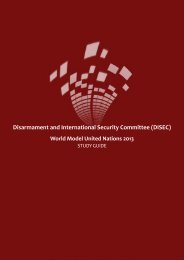Social, Humanitarian and Cultural Committee (SOCHUM)
Social, Humanitarian and Cultural Committee (SOCHUM)
Social, Humanitarian and Cultural Committee (SOCHUM)
Create successful ePaper yourself
Turn your PDF publications into a flip-book with our unique Google optimized e-Paper software.
in the first place. Additionally, as mentioned in the<br />
introduction, there is no definitive level of wealth<br />
that constitutes “poverty;” instead, it is necessary<br />
to develop policies that help each indigenous group<br />
reach their own version of economic sufficiency. 199<br />
Another way of making the MDGs more relevant to<br />
indigenous peoples is to require nations to discuss<br />
such populations in their regular MdG reports.<br />
Each of the causes of impoverishment among<br />
indigenous peoples discussed above requires unique<br />
solutions. The easiest one to solve is most likely<br />
the lack of participation of indigenous peoples in<br />
the development discussion. Most governments<br />
simply do not seek input from indigenous groups<br />
concerning developmental polices <strong>and</strong> initiatives,<br />
<strong>and</strong> it should not be very difficult for governments to<br />
create methods of encouraging participation. Such<br />
solutions could involve more budget transparency for<br />
development programs or the creation of indigenous<br />
advisory councils. 200 Some suggest that the process of<br />
political empowerment only occurs over a long period<br />
of time <strong>and</strong> that local direct empowerment may have<br />
a more immediate effect. There is evidence from<br />
other aspects of development that this strategy may<br />
work. In some rural, impoverished districts in Mexico,<br />
for example, parents were given the ability to allocate<br />
small sums of money for various education programs;<br />
Specialized proposals are necessary for each indigenous group to<br />
lift them from poverty <strong>and</strong> improve their well-being.<br />
after this system was initiated, the st<strong>and</strong>ardized test<br />
scores of these schools improved. 201<br />
Other causes of impoverishment among indigenous<br />
peoples may be more difficult to solve. The Declaration<br />
on the Rights of indigenous Peoples explicitly protects<br />
indigenous l<strong>and</strong> rights, but most countries have failed<br />
to implement these policies on a national level. Thus,<br />
the framework exists to solve this problem, but it is<br />
now a matter of putting it into practice. A successful<br />
solution to this problem will involve the creation of<br />
a system for evaluating indigenous l<strong>and</strong> rights <strong>and</strong><br />
adjudicating disputes between indigenous peoples<br />
<strong>and</strong> private corporations. Such a proposal could also<br />
include a method of compensation for past <strong>and</strong> future<br />
relocations. A complex plan is also needed to stop<br />
indigenous peoples from being denied basic services,<br />
housing, <strong>and</strong> employment because of their ethnicity.<br />
Some suggest that countries implement affirmative<br />
action-type programs for public employment, <strong>and</strong><br />
housing so that indigenous minorities that are unable<br />
to secure jobs <strong>and</strong> housing in the private sector are<br />
protected. 202 Alternatively, stricter laws <strong>and</strong> penalties<br />
can be enforced to prevent such discrimination in the<br />
public <strong>and</strong> private sectors.<br />
The effects of trade liberalization are perhaps the<br />
most difficult aspect of this problem to solve. Many<br />
scholars <strong>and</strong> politicians consider trade liberalization<br />
to be an instrumental part of the modern economy<br />
<strong>and</strong> a necessary condition for sustained economic<br />
growth, so it is unlikely that most governments<br />
would be willing to act to increase tariffs <strong>and</strong> keep<br />
out transnational companies to protect indigenous<br />
industries <strong>and</strong> l<strong>and</strong> rights. Possible solutions will<br />
have to focus on preventing the effects of trade<br />
liberalization from harming indigenous peoples. Such<br />
measures could include programs to compensate<br />
indigenous workers for lost earnings or the creation<br />
of protected areas for indigenous groups to continue<br />
their traditional lifestyles free from interference from<br />
46<br />
Melbourne Host Directorate PTY LTD | Office of Media <strong>and</strong> Design

















